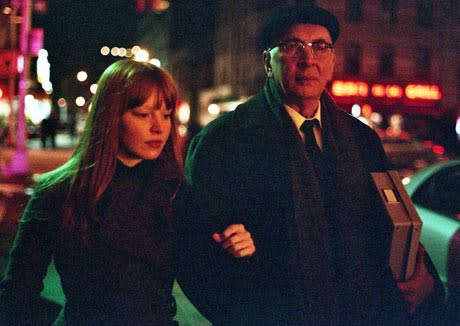Writer/Director Andrew Wagners Starting Out in the Evening focuses on the complexities of various human relationships: father and daughter, mentor and protégé, and ex-lovers taking a second kick at the can. At the centre of all of these relationships, the film successfully explores ideas of isolation and longing.
The central story follows ambitious graduate student Heather (Six Feet Unders Lauren Ambrose) as she works to convince once famous NYC literary writer Leonard (Frank Langella) that her graduate thesis can resurrect his career. After Leonard reluctantly agrees, an odd bond develops between the two characters. Ariel (Lili Taylor, also a Six Feet Under alum) is Leonards soon to be 40-year-old yoga instructor daughter. With her biological clock ticking at a deafening pitch, Ariel struggles with the prospect of nearing the end of her childbearing years without having produced a baby. Matters are further complicated when she rekindles a relationship with an ex-boyfriend that openly doesnt want children.
Of all the relationships at play, the most satisfying is the father/daughter bond between Langella and Taylor. Langella is great as the stalled artist dealing with his looming mortality while trying to support his daughter in her pursuits of happiness. Taylor is believable in her portrayal of maternal yearning, creating a character that commands respect instead of pity. Together, there is a sense of genuine commitment and love without schmaltzy sentimentality.
Less believable is the relationship between Langella and Ambrose. Though Ambrose is good as the ambitious graduate student, Langellas weightier performance anchors one end of a proverbial seesaw and Ambrose is left airborne, legs dangling. There is also an odd sexual subtext to their relationship that undermines the deeper intellectual connection. Even though Ambroses physical attraction to Langella is likely meant as an incarnation of her intellectual admiration, it feels forced and ham-handed.
The script is very good but a little too acrobatically verbose; you find yourself drawn out of the drama at times, simply because people dont talk that way. No, not even "take yourself too seriously New York intellectuals. Of the cast, Langella most ably handles the dialogue, while the others are left sounding like theyre struggling to suppress burps from a recently ingested thesaurus.
(Maple)The central story follows ambitious graduate student Heather (Six Feet Unders Lauren Ambrose) as she works to convince once famous NYC literary writer Leonard (Frank Langella) that her graduate thesis can resurrect his career. After Leonard reluctantly agrees, an odd bond develops between the two characters. Ariel (Lili Taylor, also a Six Feet Under alum) is Leonards soon to be 40-year-old yoga instructor daughter. With her biological clock ticking at a deafening pitch, Ariel struggles with the prospect of nearing the end of her childbearing years without having produced a baby. Matters are further complicated when she rekindles a relationship with an ex-boyfriend that openly doesnt want children.
Of all the relationships at play, the most satisfying is the father/daughter bond between Langella and Taylor. Langella is great as the stalled artist dealing with his looming mortality while trying to support his daughter in her pursuits of happiness. Taylor is believable in her portrayal of maternal yearning, creating a character that commands respect instead of pity. Together, there is a sense of genuine commitment and love without schmaltzy sentimentality.
Less believable is the relationship between Langella and Ambrose. Though Ambrose is good as the ambitious graduate student, Langellas weightier performance anchors one end of a proverbial seesaw and Ambrose is left airborne, legs dangling. There is also an odd sexual subtext to their relationship that undermines the deeper intellectual connection. Even though Ambroses physical attraction to Langella is likely meant as an incarnation of her intellectual admiration, it feels forced and ham-handed.
The script is very good but a little too acrobatically verbose; you find yourself drawn out of the drama at times, simply because people dont talk that way. No, not even "take yourself too seriously New York intellectuals. Of the cast, Langella most ably handles the dialogue, while the others are left sounding like theyre struggling to suppress burps from a recently ingested thesaurus.
